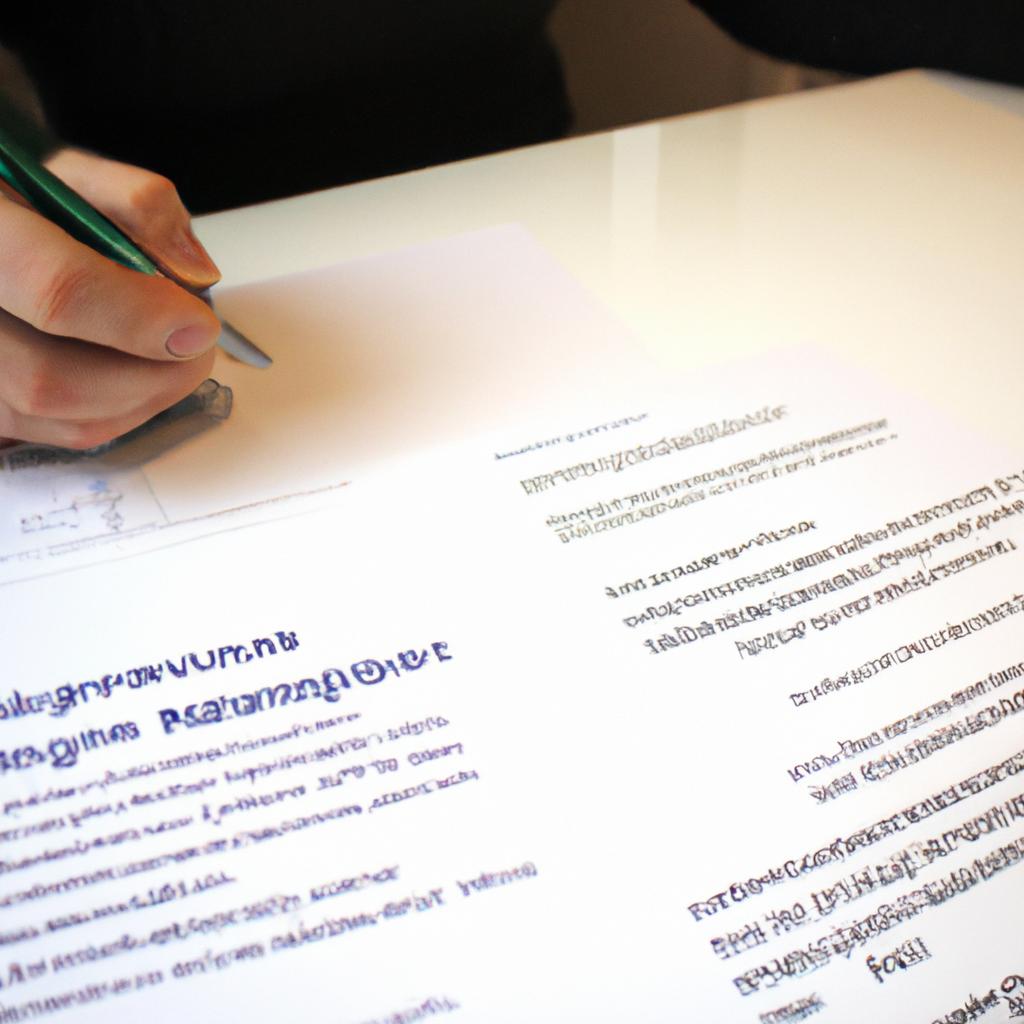Negotiating interest rates is a crucial aspect of mortgage refinancing that can have significant financial implications for homeowners. By securing a lower interest rate, individuals can potentially reduce their monthly payments and save thousands of dollars over the life of their loan. For instance, consider the hypothetical case study of John and Sarah, who have been making regular mortgage payments for five years at an interest rate of 5%. If they were to negotiate a new interest rate of 3%, they could potentially save $200 per month on their mortgage payment, resulting in substantial long-term savings.
In order to navigate the complex world of negotiating interest rates during mortgage refinancing, it is essential to understand key strategies and tips that can empower borrowers. This article aims to provide valuable insights into effective approaches for negotiating favorable interest rates. Whether through leveraging market conditions or optimizing creditworthiness, homeowners can maximize their chances of obtaining competitive rates that align with their financial goals. Armed with this knowledge, borrowers will be better equipped to engage in negotiations with lenders and secure more advantageous terms for their refinance loans.
Importance of research
Negotiating Interest Rates: Mortgage Refinancing Tips
Importance of Research
One example that highlights the significance of research in negotiating interest rates for mortgage refinancing is the case of Mr. Smith. Mr. Smith, a homeowner looking to refinance his mortgage, initially approached multiple lenders without conducting thorough research on prevailing market rates and terms. As a result, he encountered difficulties in obtaining favorable interest rates and suitable refinancing options. This demonstrates how lack of research can limit one’s ability to effectively negotiate interest rates.
To avoid such pitfalls, it is crucial to conduct comprehensive research before engaging with potential lenders or financial institutions. Firstly, researching current market trends enables borrowers to stay informed about existing interest rate fluctuations and identify potentially advantageous periods for refinancing their mortgages. Additionally, understanding the different types of loans available allows individuals to compare various loan terms and choose an option that best suits their financial goals.
Furthermore, researching specific lenders’ policies and reputations empowers homeowners by providing insight into each institution’s willingness to negotiate better terms. By examining customer reviews or seeking recommendations from trusted sources, borrowers can gain valuable information regarding a lender’s responsiveness, transparency, and track record in negotiating favorable deals.
In summary, meticulous research plays a pivotal role in successfully navigating the negotiation process when refinancing a mortgage. To emphasize this point further:
- Research equips borrowers with knowledge on current market conditions.
- It helps them understand the range of loan options available.
- Researching lenders provides insights into their reputation and willingness to negotiate.
- Thorough preparation through research increases the chances of securing more favorable interest rates.
By delving into these aspects prior to entering negotiations with potential lenders or financial institutions, homeowners are better equipped to advocate for themselves during mortgage refinancing discussions
Understanding your financial standing
Negotiating Interest Rates: Mortgage Refinancing Tips
Importance of Research
To successfully negotiate interest rates for mortgage refinancing, it is crucial to thoroughly research various aspects related to your financial standing and the current market conditions. By understanding these factors, you can make informed decisions that will help you secure a favorable interest rate. For instance, consider a hypothetical scenario where John wants to refinance his mortgage to lower his monthly payments. Through thorough research and analysis, he discovers several key points:
-
Market Trends: Understanding the trends in interest rates can provide valuable insight into when it might be advantageous to refinance. Analyzing historical data and economic forecasts allows individuals like John to identify opportune moments with potentially lower interest rates.
-
Credit Score Evaluation: Lenders often assess borrowers’ creditworthiness through their credit scores. Before negotiating an interest rate, it is important for John to review his credit report and ensure its accuracy. Additionally, he should take steps to improve his credit score if necessary by paying off debts or correcting any errors on the report.
-
Loan-to-Value Ratio (LTV): The ratio between the loan amount and the appraised value of the property plays a significant role in determining interest rates for mortgage refinancing. A higher LTV ratio may result in less favorable terms due to increased perceived risk for lenders.
-
Comparison Shopping: Conducting comprehensive research on different lenders’ offers is essential before entering negotiations. Evaluating various options based on fees, closing costs, and customer reviews allows John to select the most suitable lender offering competitive interest rates.
By considering these factors during his research process, John increases his chances of securing a more favorable interest rate when negotiating for mortgage refinancing.
Table 1: Factors Influencing Interest Rate Negotiations
| Factor | Impact | Emotional Response |
|---|---|---|
| Market Trends | Favorable | Excitement, Optimism |
| Credit Score | Positive | Confidence, Satisfaction |
| Loan-to-Value Ratio | Less Favorable | Concern, Caution |
| Comparison Shopping | Advantageous | Empowerment, Relief |
To successfully negotiate interest rates for mortgage refinancing, it is crucial to have a clear understanding of your financial standing. This includes assessing your income, expenses, and overall debt situation. By conducting an in-depth evaluation of these factors, you can present yourself as a financially stable borrower. This will not only increase your credibility but also improve your chances of securing a better interest rate.
Analyzing your financial standing involves several considerations:
-
Income Stability: Lenders often prefer borrowers with reliable income sources that demonstrate stability over time. Providing evidence such as pay stubs or tax returns highlighting consistent earnings can help strengthen your position during negotiations.
-
Debt-to-Income Ratio (DTI): Calculating your DTI ratio by dividing monthly debts by gross monthly income helps lenders assess your ability to repay the loan. A lower DTI ratio indicates less risk for lenders and may result in more favorable terms during negotiations.
-
Savings and Assets: Demonstrating strong savings habits and having substantial assets can positively influence negotiations. These indicate financial responsibility and provide lenders with reassurance regarding repayment capabilities.
By thoroughly evaluating these aspects of your financial standing before entering into negotiations, you will be better equipped to advocate for yourself when discussing interest rates with potential lenders.
Transitioning seamlessly into the subsequent section about “Comparing lenders and their offers,” it becomes evident that researching different options and understanding one’s own financial status are key prerequisites for navigating the negotiation process effectively.
Comparing lenders and their offers
Transitioning from the previous section on understanding your financial standing, let us now delve into comparing lenders and their offers. To illustrate this process, consider the following example: Imagine you are a homeowner looking to refinance your mortgage in order to take advantage of lower interest rates.
When it comes to comparing lenders and their offers for mortgage refinancing, there are several key factors to consider:
-
Interest Rates:
- Lenders offer different interest rates based on various factors such as credit score, loan-to-value ratio, and economic conditions.
- It is important to compare the interest rates offered by multiple lenders to ensure you secure the most favorable rate possible.
-
Fees and Closing Costs:
- In addition to interest rates, lenders may charge various fees and closing costs during the refinancing process.
- Be sure to review these costs carefully as they can significantly impact the overall cost of refinancing.
-
Loan Terms and Conditions:
- Different lenders may have varying terms and conditions regarding repayment schedules, prepayment penalties, and other loan features.
- Assess these terms thoroughly to ensure they align with your financial goals and circumstances.
To further illustrate how lender offers can differ, here is a comparison table showcasing hypothetical offers from three different lending institutions:
| Lender | Interest Rate (%) | Fees ($) | Loan Term (years) |
|---|---|---|---|
| Bank A | 3.25 | $2,000 | 15 |
| Credit Union B | 3.50 | $1,500 | 20 |
| Online Lender C | 3.75 | $1,000 | 30 |
As seen in the above table, each lender has its own unique combination of interest rate, fees, and loan term. This emphasizes the importance of carefully evaluating all aspects before making a decision.
In summary, comparing lenders and their offers is crucial in the mortgage refinancing process. By considering factors such as interest rates, fees and closing costs, as well as loan terms and conditions, you can make an informed choice that aligns with your financial goals. Now let us explore the next step: negotiating terms and conditions to optimize your refinancing experience.
Negotiating terms and conditions
Building on the understanding gained from comparing lenders and their offers, it is now important to focus on negotiating terms and conditions. By taking proactive steps in this phase of refinancing your mortgage, you can secure more favorable interest rates and financial terms tailored to your specific needs.
Negotiating Terms and Conditions
To illustrate the significance of negotiating terms and conditions, let’s consider a hypothetical scenario. Imagine that you have received two loan offers from different lenders for mortgage refinancing: Lender A offers an interest rate of 3.5%, while Lender B provides an offer with a slightly higher rate at 4%. However, upon closer inspection, you discover that Lender A imposes hefty prepayment penalties if you decide to pay off your mortgage before a certain period expires, whereas Lender B does not have such restrictions. In this case, even though Lender A initially appeared to provide better terms due to the lower interest rate, Lender B might actually be the more advantageous choice when considering long-term costs.
When negotiating terms and conditions during mortgage refinancing, keep in mind these key strategies:
- Clearly define your objectives: Before entering negotiations, determine what is most important to you – whether it’s securing a lower interest rate or minimizing fees and penalties. Having clear goals will help guide your negotiation process effectively.
- Leverage competing offers: If you’ve received multiple loan offers from different lenders, use them as leverage in negotiations. Highlighting competitive options may encourage lenders to improve their own proposals.
- Seek professional advice: Consulting with a trusted financial advisor or mortgage broker can provide valuable insights into market trends and potential negotiation tactics. Their expertise can assist you in navigating complex terminology and ensuring that all aspects of the deal are considered.
- Be prepared to walk away: Remember that negotiation is about finding mutually beneficial solutions. If the lender is unwilling to accommodate your needs or demands excessively unfavorable terms, be ready to explore other options.
Table: Comparing Lender A and Lender B Offers
| Terms | Lender A | Lender B |
|---|---|---|
| Interest Rate | 3.5% | 4% |
| Prepayment Penalties | High fees for early repayment | No prepayment penalties |
| Other Fees | Appraisal fee, origination fee, etc. | Minimal additional fees |
In conclusion, negotiating terms and conditions is a critical step in securing favorable mortgage refinancing offers. By clearly defining your objectives, leveraging competing offers, seeking professional advice, and being prepared to walk away if necessary, you can increase your chances of obtaining more advantageous financial terms that align with your long-term goals.
Considering the long-term costs involved in mortgage refinancing, it is essential to delve into various factors before making a final decision.
Considering the long-term costs
Negotiating Interest Rates: Mortgage Refinancing Tips
…
Taking into account the previously discussed terms and conditions, it is crucial to consider the long-term costs associated with mortgage refinancing. One of the key factors to evaluate is the interest rate offered by lenders. To illustrate this point, let’s consider a hypothetical scenario where John is looking to refinance his mortgage. Currently, he has an outstanding loan balance of $300,000 and an interest rate of 5%. By negotiating a lower interest rate of 4%, John could potentially save thousands of dollars over the life of his loan.
To better understand the impact of interest rates on long-term costs, here are some important considerations:
- Monthly Payments: A decrease in interest rates can lead to reduced monthly mortgage payments, freeing up additional funds that homeowners can allocate towards other financial goals or necessities.
- Total Interest Paid: Lowering the interest rate not only decreases monthly payments but also reduces the total amount paid in interest over time. This means more money stays in your pocket instead of going towards paying off debt.
- Loan Term Length: When refinancing at a lower interest rate, homeowners may have the option to shorten their loan term without significantly increasing their monthly payments. This allows them to pay off their mortgage sooner and build equity faster.
- Overall Savings: By comparing the total cost of borrowing between different interest rates, homeowners can determine if refinancing is financially beneficial in the long run.
Consider this table showcasing potential savings based on various scenarios:
| Loan Balance | Interest Rate | Monthly Payment | Total Interest Paid |
|---|---|---|---|
| $300,000 | 5% | $1,610 | $279,767 |
| $300,000 | 4% | $1,432 | $215,545 |
As seen above, even a 1% decrease in interest rate can result in substantial savings over time. It is important to remember that these figures are hypothetical and individual circumstances may vary. Nevertheless, they serve as a useful guide to demonstrate the potential benefits of negotiating lower interest rates when refinancing.
In light of the considerations discussed thus far, seeking professional advice becomes essential in navigating the intricacies of mortgage refinancing. Financial advisors or mortgage brokers possess expertise and industry knowledge that can help homeowners make informed decisions tailored to their specific needs and financial goals. By consulting professionals, individuals can gain valuable insights into current market conditions and negotiate more effectively with lenders.
Transitioning seamlessly into the subsequent section about “Seeking professional advice,” it is crucial to tap into the expertise available to ensure every aspect of the refinancing process is handled diligently and efficiently.
Seeking professional advice
Considering the long-term costs of mortgage refinancing is crucial before making a decision. It is important to evaluate not only the immediate financial impact but also the potential savings or expenses over time. For example, let’s consider a hypothetical case study: Mr. Smith wants to refinance his mortgage to take advantage of lower interest rates. By refinancing, he can reduce his monthly payments by $200. However, when calculating the total cost over the life of the loan, including fees and additional interest paid due to extending the term, Mr. Smith realizes that he would end up paying an extra $50,000 in total compared to his current mortgage.
To ensure that you make an informed decision about mortgage refinancing, here are some key factors to consider:
- Loan Term: Extending the term may decrease your monthly payment but could result in higher overall costs due to additional interest.
- Closing Costs: Refinancing typically involves closing costs such as origination fees, appraisal fees, and attorney fees. These should be factored into your calculations.
- Interest Rate Differential: Comparing your current interest rate with potential new rates will help determine if the overall savings justify refinancing.
- Prepayment Penalties: Some mortgages impose penalties for paying off your loan early. Be sure to understand any prepayment penalties associated with your current mortgage before proceeding.
- Saving money in the long run can provide peace of mind and financial stability.
- Overpaying on a mortgage can limit funds available for other essential expenses or future investments.
- Mortgage refinancing offers an opportunity to optimize financial resources and potentially free up cash flow.
- Failing to carefully analyze long-term costs may lead to regrettable financial decisions.
Emotional table (example):
| Pros | Cons |
|---|---|
| Lower monthly payments | Higher overall costs |
| Potential savings on interest | Additional fees and charges |
| Improved cash flow | Extended loan term |
| Opportunity for financial optimization | Possible prepayment penalties |
By carefully considering the long-term costs, along with other factors like potential savings and fees involved in mortgage refinancing, you can make a well-informed decision that aligns with your financial goals. Seeking professional advice is another step to ensure that you navigate this complex process successfully without any unpleasant surprises down the road.
 SMI Loan
SMI Loan



